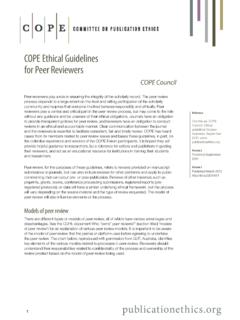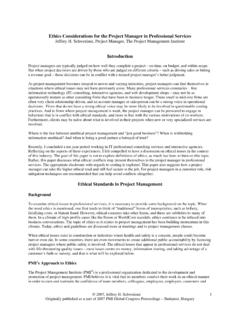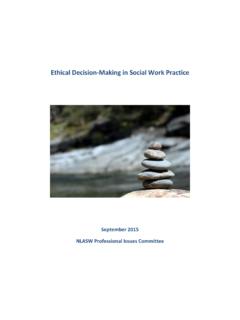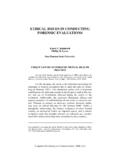Transcription of PURPOSE BACKGROUND - UKZN Research Office
1 1 Suggested citation: NHREC (2012). Payment of trial participants in South Africa: ethical considerations for Research Ethics Committees (RECs). NHREC. 1. PURPOSE The PURPOSE of this document is to propose to Research Ethics Committees (RECs) certain considerations for payment of clinical trial participants in South Africa. 2. BACKGROUND There has been controversy in South Africa and other countries as to whether trial participants should be paid and if so, for what and how much. On the one hand, there are concerns that even modest payments may cause participants to enrol in trials without duly considering the risks, thereby acting as an undue incentive and exploiting the situation of vulnerable participants.
2 On the other hand, concerns have been raised that participants deserve appropriate compensation for their contribution to clinical trials. This area of Research ethics is a complex, controversial one where even reasonable people may not always agree. People may intuitively (or explicitly) favour a particular model of payment. For example, people who advocate that participants should be paid for expenses only are favouring a Reimbursement model. People who advocate that participants should be paid for their contribution in terms of time and burden-assumption are favouring a Compensation model.
3 In South Africa, at present, clinical trial participants tend to be paid R150 per visit. The Medicines Control Council (MCC) has recommended that trial participants be reimbursed a minimum of R150 per trial visit. This recommendation was made at the time that the National Health Research Ethics Council was not formally constituted. While not necessarily intended as a flat rate , this approach may have been understood and applied as such by stakeholders. 3. CURRENT APPROACHES TO TRIAL PAYMENT: PROS AND CONS The MCC recommendation has apparent advantages in that it is relatively easy to administer, and it appears fair because most trial participants across the country tend to get paid a similar basic amount unless there are additional specific and justifiable costs.
4 However this approach has a number of disadvantages that may lead to unfairness and inequity: 2 Most trial participants are paid a similar amount, even when they may be assuming very different Research burdens (time and inconvenience). For example, participant A in a vitamin trial who spends 1 hour at a site and fills in a simple questionnaire may be paid R150, while participant B in a microbicide trial who may spend 3 hours at a site, and undergoes counselling, HIV testing, examinations like colposcopy and social harm monitoring is also paid R150. Furthermore, trial participants are paid a similar amount, even when their actual expenses may be very different.
5 For example, participant C who spends R50 on travel, R20 on food and R100 on child-care ( R170,00) will not be fully reimbursed for their expenses, whereas participant D who spends R10 on taxi-fare has made money from the arrangement. In both cases, the payment of a flat rate may allow unfairness to arise. Additionally, this approach to payment may act as an inappropriate incentive that undermines the autonomous decisions of trial participants to enrol in Research . That is, it is possible that participants may minimise their concerns about the risks or pay inadequate attention to the risks in order to access the payments.
6 This is particularly the case where participants are drawn from vulnerable groups, where conditions already exist that may compromise their ability to give authentic informed consent. This is also the case where payment exceeds actual Research burdens (time, inconvenience) or direct expenses. The possibility of undue inducement can be reduced by good consent procedures that help participants to process risks and by quality ethical review to minimize Research risks. In addition, sound screening processes can offset the possibility that participants conceal information in order to access trial payments.
7 Because both informed consent and ethical review are imperfect processes, where efforts can be made to improve payment approaches directly, these should be undertaken. Lastly, this approach may undermine the role of RECs who are properly placed to make decisions about the appropriateness of payment amounts and schedules in the context of a full assessment of the risks and benefits of the trial, and information provided by the investigators about the study. 4. considerations FOR PAYMENT OF trial participants For the reasons cited above, this document proposes that RECs should take account of the considerations listed below when deciding about payment in trials.
8 Such decisions should be specific to the trial at hand, defensible in terms of ethical principles and balanced in their protections of trial participants whilst facilitating the conduct of meaningful Research . RECs may wish to ask investigators to propose payment in accordance with these considerations . The amount and schedule of payment to participants should depend on the following three components: 3 trial participants should be compensated appropriately for their time. It has been recommended by some commentators that time payments should be made at rates commensurate with unskilled labour rates.
9 This acknowledges that trial participation (while valuable) does not necessarily require special skills and training, but does entail expending effort. For example, hourly rates for unskilled civil engineering workers are approximately per hour in South Africa. The above recommendation recognises that payment is being made for what the work of Research participation is worth, and not what the participants actual time is worth. Even if participants are not formally employed, it could be considered that participation in Research may compete with efforts to find other similar economic opportunities and that participants forgo other opportunities while they are engaged in trials, therefore participants should be compensated for their time.
10 Investigators could be asked to estimate the amount of time participants will spend engaged in Research activities for each trial visit. trial participants may be compensated for inconvenience. In some studies, participants will be required to undergo certain procedures that may cause inconvenience or discomfort. Consideration should be given to compensating participants for this inconvenience, over and above time payments. Payment amounts for inconvenient procedures should reasonably reflect the extent of such inconvenience. For example: the inconvenience attached to answering a simple and unobtrusive questionnaire may be lower than a blood draw.






